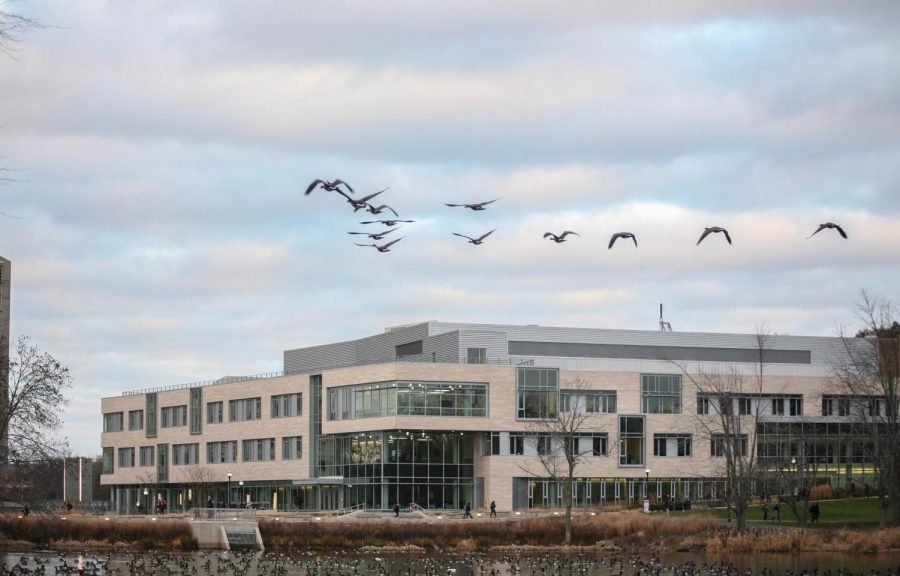The U.S. Senate confirmed Amy Coney Barrett to the Supreme Court on Oct. 26. Her confirmation required five consecutive days of Senate meetings and occurred eight days prior to the 2020 presidential election.
The wide-reaching repercussions of Barrett’s confirmation were of concern to University of Massachusetts faculty and students alike in the days following the confirmation.
For senior political science major Siobhan Reidy, Barrett’s confirmation lacked an element of shock. “I really wasn’t surprised. The day that RBG [Ruth Bader Ginsburg] passed away I kind of knew that the GOP [Republican Party] was just going to force through a nominee.”
Reidy also pointed to the double standard she believes the Republican senators exemplified in confirming Barrett; in 2016, those same Republicans blocked hearings for President Barack Obama’s Supreme Court nominee, Merrick Garland, over 200 days before the election.
Barrett’s seat on the Supreme Court solidifies conservative influence, as Republican appointed justices now outnumber Democratic appointed justices six-to-three.
“I’m really worried, not just for Roe v. Wade, not just for marriage equality, not just for voting rights but just for the survival of American democracy under a six-three conservative bench,” Reidy said.
Freshman theater major Danial Stephen Cousins also highlighted a similar idea: “My first thought about Barrett’s confirmation is that the current U.S administration clearly exemplified how little they care for democracy.”
“More than 65.5 million Americans have voted so far, many hoping to influence the Supreme Court seat and days before the election she was confirmed. I think it’s abhorrent,” Cousins said.
Reidy and Cousins’ criticisms of Barrett stem from her ideologies and personal belief system. Drawing from constitutional originalism, Barrett’s conservative Catholic background could give the court the ability to overturn policy that would leave a detrimental mark on many Americans.
“When [Barrett’s ideology is] that extreme, it’s hard to separate that from your professional life,” said Reidy. “That is not something that should ever be used to dictate someone’s human rights and equality and I feel like that’s what it’s going to come down to.”
Among other legislation, Barrett’s beliefs have been correlated to her support of overturning the Affordable Care Act (ACA). Implemented under the Obama administration, the ACA provides regulations in the individual insurance market, including protection for people with pre-existing medical conditions.
Laura Attanasio, professor of health policy and management, cited the ACA as crucial to American life itself. “Because of the Affordable Care Act and the individual market, insurers can’t charge people more or deny them coverage because they have pre-existing conditions,” she said.
Attanasio explained, “There was also an individual mandate that [stated that] people were going to be required to have some sort of health care or pay a fine and through an act of Congress, the fine was reduced to zero for the individual mandate starting in 2019.”
The Supreme Court is set to hear a case regarding the validity of the ACA one week after Election Day. “This case is essentially saying that because the individual mandate is, in practice, no longer in effect because the penalty is zero, that that should invalidate the entire Affordable Care Act,” said Attanasio.
“The Affordable Care Act is a number of other things that make care more accessible to people and protect people,” she said. She also mentioned specifically that the ACA hinders the ability for health insurers to charge women more than men and to not cover maternity care, as they did often prior to the ACA’s enactment.
“If the whole law were to be struck down at this point, that would be really catastrophic, frankly, for people’s health insurance security in the country,” she added.
Another aspect of American healthcare, access to abortion, was of concern to the UMass community as well. This concern comes as a result of Barrett’s many conservatively biased rulings when she served as a federal appeals court judge.
“In cases such as Roe v. Wade, a conservative leaning in the Supreme Court will most likely be detrimental for women’s rights to abortion,” Cousins said.
There is no Supreme Court hearing set to determine the fate of Roe v. Wade, but community members believe that a threat remains in the possibility of a future hearing.
“Abortion is a key aspect to gender equality and without it, everything else will start to fall to pieces as well,” Reidy said.
She connected this to the threat to human rights that she feels is so evident in the United States in the current political atmosphere.
“I feel like there are just too many threats right now to human rights and we’re putting human rights into a debate rather than a conversation about how we can best achieve that,” said Reidy.
“Just seeing your human rights and basic equality attacked every day and up for debate every day is really disheartening and frustrating – there are no words to describe how angry that makes me.”
Ella Adams can be reached at [email protected]. Follow her on twitter @ella_adams15. Mahidhar Sai Lakkavaram can be reached at [email protected]. Follow him on twitter @Mahidhar_sl.





















